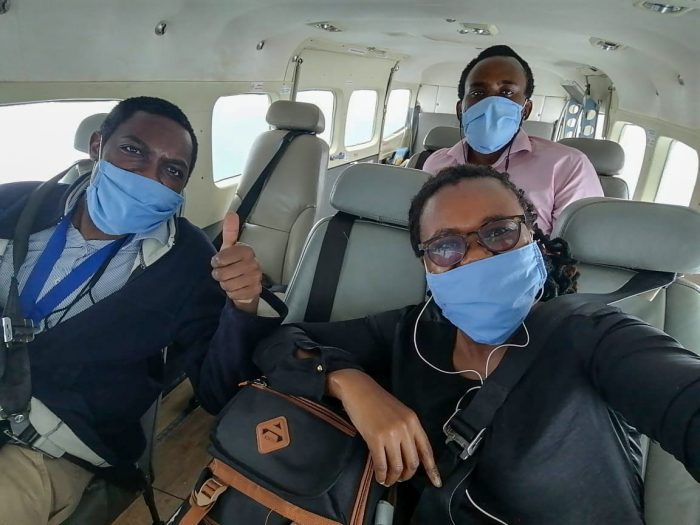A Reflection of 2020 – MAF South Sudan
The impact of COVID-19 has been felt across almost all of our programmes. It has affected our staff, our ability to fly, and the people we have been able to reach. Below is a summary of how this impact has been felt in South Sudan.
General Information
As the world was locking down in April, South Sudan was no different. With only four pilots in country and two of those unable to fly at the time, MAF was conducting only limited flight operations. In mid-April all domestic flying was halted and the programme began working on getting an exemption. We were given permission to carry out some COVID-19 flying supporting the World Health Organisation (WHO) and Ministry of Health. We also sought approvals to enable us to carry out aircraft swaps with the Kenya programme for maintenance.
As part of the COVID-19 response, we flew COVID test kits to Nimule, a town on the Ugandan border which would be used to test truck drivers coming into the country with essential supplies.
Demand for cargo flights increased as partners needed to resupply their field programmes. We transported food and building supplies for Samaritan’s Purse and malaria medication for CARE. We also carried out two aircraft swaps with MAF Kenya.
By May passengers had to be COVID-19 tested and receive special permission to travel, but we continued transporting cargo for our partners as well as some COVID-19 related flights – one for WHO taking COVID-19 test samples from a town in the north of South Sudan to Juba for testing, and other chartered flights for our NGO partners transporting soap, hand sanitisers and masks.
The number of COVID-19 cases at this time was rising, though numbers were still relatively low. However, the curfew was relaxed and restrictions on businesses and restaurants lifted.
At the end of May, cases continued to rise significantly each day to almost 300 cases. The first death was reported (a high-profile politician) and there were three more deaths in the days following. Passenger flights resumed for those who had tested negative for COVID-19. MAF performed two flights for the Health Pool Fund carrying COVID-19 posters and training materials which would be used to train Community Health Workers and raise awareness of COVID-19.
By June confirmed cases had risen to 994 with 10 deaths. Flight requests began to slow and due to the decreased workload and the need to social distance, staff were working at the MAF office in shifts.
In mid-June it was reported that South Sudan had ranked lowest in the world in terms of its ability to mobilise a COVID-19 response (Source: DKV.Global). Concern was raised over increased levels of insecurity since the new government was installed in February, due to the absence of regional government. The government has been called upon to appoint regional governors urgently.
At this time, we continued to support our partners, including Samaritan’s Purse, TearFund, Kuron Peace Village, Presbyterian Church of South Sudan, Jhpiego Corporation (HIV meds) and Jesuit Refugee Service.
In mid-June, WHO reported an increase in respiratory-related deaths amongst displaced people living in Bentiu Protection of Civilians Camp (PoC). WHO official, Joseph Wamala, told reporters, “We have actually uncovered trends that we are still investigating to determine whether the rise in respiratory-related deaths is due to COVID-19 or a different ailment.”
By the end of July official figures had risen to 1,069 cases of COVID-19 and 46 deaths but the government was only conducting 100 tests per day, so these figures could have been higher. Humanitarian organisations began highlighting how continued school closures were impacting girls, with concerns that they would never return to school, a rise in teenage pregnancies, early marriage and gender based violence.
Shuttle flights resumed and with them we experienced an increase in demand for flights. We also continued flying charter flights and medevacs, including two injured military personnel with gunshot wounds being added onto a scheduled shuttle flight.
Towards the end of September more and more pilots were able to return to South Sudan but due to the 14-day quarantine requirement it took a few weeks for this to translate into operational capacity. South Sudan continued to face huge economic and humanitarian challenges made worst by the coronavirus pandemic and recent flooding across the country.
In October, several pilots completed license renewal and check training in Kenya. Quarantining rules for people entering the country relaxed so that those with a negative COVID-19 test no longer needed to quarantine.
The South Sudan Doctor’s Union called on concerned authorities to reinforce COVID-19 preventative measures in the wake of the global resurgence of new infections. There were concerns that the virus would begin to spread again after schools, churches and other institutions were reopened.
At the beginning of December, South Sudan had had 3,109 confirmed cases of COVID-19 with 61 deaths. After a tough year flying, we are however pleased to report that the project to construct the new housing at Korok has begun and, at the time of writing (Dec 2020), the contractors would be breaking ground shortly.







